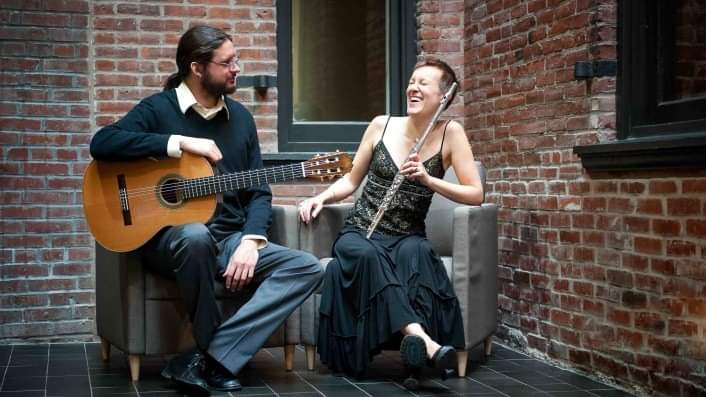by Mike Telin

On Sunday, June 5 at the Cleveland Institute of Music’s Kulas Hall, these extraordinary musicians presented a program of 21st-century music that bore witness to their irreproachable technical skills and their mesmerizing palette of colors.
Presented as part of the Cleveland International Classical Guitar Festival, Duo Damiana opened with Michael Fiday’s Five Haiku (2013) — a piece inspired by texts of 17th-century Japanese Haiku master Matsu Basho.
From the opening rhythmic taps on the guitar that are gradually joined by beat-box accents in the flute, which then give way to a sequence of evolving rhythms, the players held the audience in rapt attention. The second Haiku is defined by a series of short motifs that become the arc of a conversation between the instruments, while the seconds-long third Haiku continues the conversation. In the fourth, guitar chords underpin lush, lyrical melodies in the flute, and the concluding poem is a dance. Keeping true to its title, Five Haiku has a lot to say in a short period of time, and Duo Damiana interpreted it with poise.
Written for and premiered by the Duo, John Liberatore’s The Soughing Wind (2015) is based on a three-line poem by William Carlos Williams. Written in a five-movement arc, the work opens with harmonics in the guitar that support a long, serene flute line, while movement two is full of catchy, bouncing rhythms. Barth and Hennings were at their most animated during the playful exchanges of short, whimsical musical material in the third. The soft, meditative fifth can only be fully appreciated in live performance. Here the composer directs the flutist to play as quietly as possible. And Barth’s dynamic control was astonishing as she played the nearly inaudible ending all while maintaining a presence in her sound.
The performance also included the world premiere of Herbert Vazquez’s El Jardin de los destellos (The garden of the delicate sparkles). Dedicated to the Duo, the composer writes: “I have always had a feeling of intimacy and introspection when walking through a Japanese garden. To me Japanese gardens possess a delicate expression of both the human existence and the passing of time.”
Vazquez’s music is so vivid that you can feel the fireflies around you. Accented snaps and thumps from the guitar transition into fast, interlocking technical passages and complex rhythms. The work is like a cabinet of curiosities for the ears — one that Barth and Hennings turned into a sonic heaven, setting the stage for David Lang’s beautifully melodic Gift (2018).
Shafer Mahoney’s Shining River (2007) is inspired by the American naturalist John Muir, and the music paints a picture that is at times placid and at times rippling. Here Barth was at her most lyrical as her inner-singer came forth.
Tōru Takemitsu’s Toward the Sea was the perfect concert closer. Written in 1981 — the only work on the program not from the 21st century — it still sounds thoroughly modern. Takemitsu writes in his composer note that “music is like a river or a sea. As many different currents create those oceans, so does music deepen our lives with constantly changing awareness.”
Commissioned by Greenpeace for the Save the Whales campaign, the piece is written in three movements whose titles reflect Herman Melville’s most famous novel. “The Night” is calm, “Cape Cod” soft and meditative, and “Moby Dick” picturesque with whales splashing in the ocean. Throughout Barth and Hennings were astute interpreters of Takemitsu’s score.
Published on ClevelandClassical.com June 17, 2022.
Click here for a printable copy of this article



